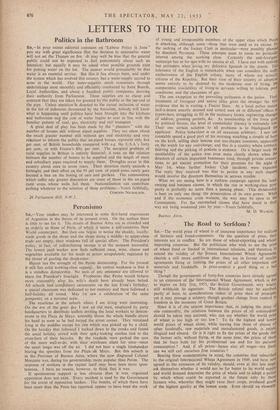Peronismo
S1R,—Your .readers may be interested in some first-hand impressions. of Argentina in the throes of its present crisis. On the surface there is little to see for it. The streets of Buenos Aires are as crowded and as orderly as those of Paris, of which it 'seems a self-conscious New World counterpart. But then one begins to notice the shoddy, locally- made goods in the shops and the shops doing a middle- to upper-class trade are empty, their windows full of special offers. The President's policy, in fact, of redistributing income is at the moment successful. The lowest paid worker now finds 'sufficient meat, wine, cheese and vegetables available for his needs at prices scrupulously regulated by the threat of gaoling the shopkeeper.
Herein lies the strength of the Peron dictatorship. For the present it still has solid working-class support. Its central weakness is that it is a mindless dictatorship. No men of any eminence are allowed to share the President's limelight. Prophecies that Peron would behave more reasonably after his wife's death have already been belied. All schools had comSulsory ceremonies on the late Evita's birthday; a special classroom was dedicated to her memory and there followed a half-holiday all round. May 1st saw a celebration of the same pomposity on a national scale.
The reactions in the suburb where I am living were interesting. On the eve of the great day I saw an old man, employed by party headquarters to distrlibute leaflets inviting the local workers to demon- strate in the Plaza de Mayo, solemnly throw the whole bundle above his head as soon as he had turned the street corner. They remained lying in the puddles except for one which was picked up by a child. On the holiday that followed 1 walked down to the creeks and found the usual holiday crowd with their spiky-looking catches tied to the cross-bars of their bicycles. By the roadside were parked the cars of the more well-to-do, with their wirelesses silent for once—since the usual tango was off the air. I did not hear a single loudspeaker blaring the speeches from the Plaza de Mayo. But this suburb is in the. Province of Buenos Aires, where the now disgraced Colonel Mercante was, during his governership, more popular than Per6n. The response of workers in the capital itself may have been more spon- taneous. I have no reason, however, to think that it was.
If spontaneous support is less obvious than it' was, organised opposition does not exist. -Every incident is used by the Government for the arrest of opposition leaders. The bombs, of which there have been more than the Press has reported, appear to have been the work
of young and irresponsible members of the upper class which Pere& is attacking, although some—those that were used as an excuse for the sacking of the Jockey Club in particular—were possibly planted by dissident Perdnists. These attempts seem to rouse no particular interest among the working class. Certainly the anti-foreigner, campaign has so far met with no success at all. I have met with nothin8, but politeness when airing my defective Spanish in the streets. ThIS tolerance of the English is remarkable when one considers the stuff,' exclusiveness of the English colony, many of whom are actually citizens of the Republic. But their view of their country of adoption- seems entirely to be dictated by the moderate cost of living, th comparative availability of living-in servants willing to tolerate poo conditions, and the cheapness of gin.
The one exception to the prevailing politeness is the police. Thei treatment of foreigner and native alike gives the stranger the first evidence that he is visiting a Fascist State. At a 'local police station; half-a-dozen smartly dressed and armed men sit in different a typewriters, struggling to fill in the necessary forms, registering changes . of address, granting permits, &c. As membership of the force ,god by political favour, the level of constabular literacy is extremely lows' Their one certain solution to all problems is to blackguard the; applicant. Police behaviour is on all occasions arbitrary. I saw one constable spend a good part of his morning watching a couple of boYs on the kerb, selling their lemons and mis-shapen tomatoes, apparentlY on the watch for any overcharge; and this in a country where robbery• thiving and the picking of pockets is endemic. On a larger scale the unreliability of the police was even more clearly shown when the directors of certain important businesses tried, through private canna' tions, to get special protection for their premises for the night d May 1st, when further Jockey Club incidents were expected. The reply they received was that to persist in any such request would involve the directors themselves in serious trouble.
What we are seeing here is a ruthless campaign against the land'
owning and business classes, in which the rise in working-class pros'; perity is probably no more than a passing phase. This dictatorshIP is bent on only one thing: the preservation of its own power. When and if the economic crisis worsens, the way may be open to t11.6 Communists. For the entrenched classes that have stood in the way are being weakened year by year.—Yours faithfully, Buenos Aires.
M. D. WATK IN.


































 Previous page
Previous page